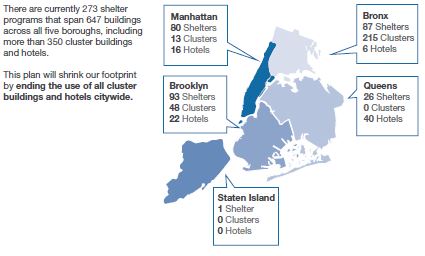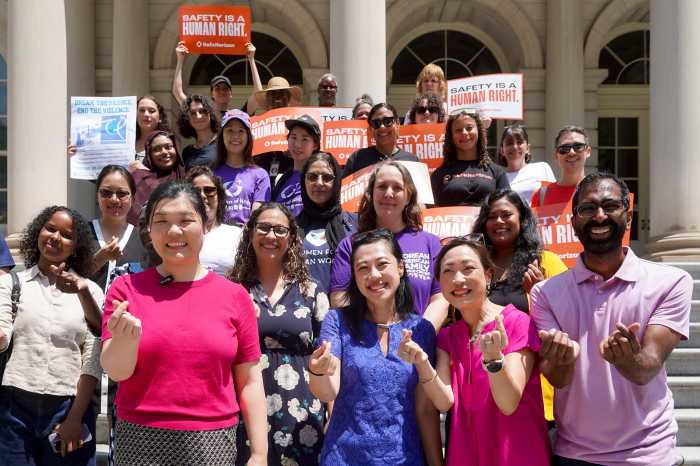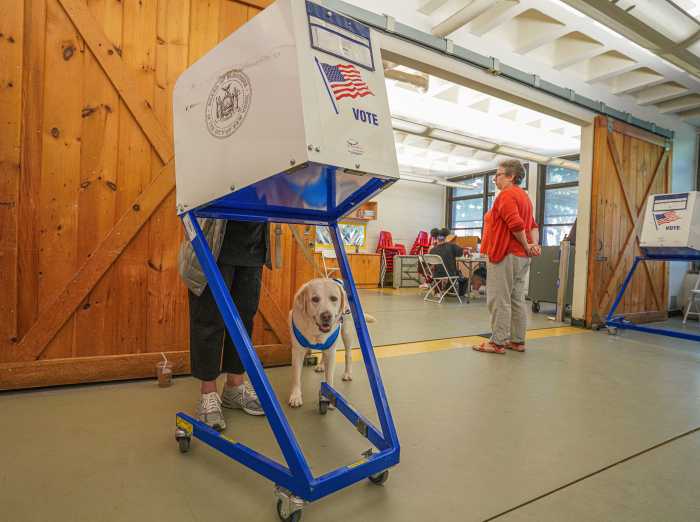If the city’s going to “turn the tide” and reduce homelessness, Mayor Bill de Blasio says, Queens will be a playing a major role in that effort.
As the city continues to struggle with a surging homeless population, de Blasio announced on Tuesday his “Turning the Tide on Homelessness in New York City” plan, which aims to eliminate ineffective and inadequate cluster sites and commercial hotels, and create new homeless shelters across the five boroughs.
Queens has the most shelter residents in commercial hotels — almost half of the city’s total — as the borough operates 40 hotels as homeless sites. Even so, de Blasio indicated this was not an ideal solution toward the growing rate of homelessness in the city.

De Blasio noted that hotel rooms are more expensive to rent than the cost of traditional shelters, and cluster sites are often afflicted by poor conditions. Both cluster sites and commercial hotels do not have the space for onsite social services, making it more difficult for the individuals and families living in these locations to access the services need to get them back on their feet.
By eliminating these cluster apartments and hotels, and moving residents into actual shelters, the mayor said, the Department of Homeless Services (DHS) will be able to shrink its footprint and service the needs of the homeless.
However, under de Blasio’s new plan, neighborhoods that have few shelters but a high density of commercial hotels that are housing homeless individuals and families — such as Maspeth, Elmhurst and Corona — should expect to see the city opening new shelters there.
“As the city stops using 360 cluster and commercial hotel sites, it will open about 90 new high-quality shelters throughout the five boroughs, prioritizing areas that lack or have a limited DHS presence,” the plan states. “The city plans to realign DHS capacity to meet the needs of New Yorkers entering shelter in each community district. By providing these homeless households with shelter, services and support in their own community whenever that is appropriate, the city will be helping families and individuals to maintain their community connections to stabilize their lives and move out of shelter as quickly as possible.”
The residents of Maspeth were engaged in a months-long battle against de Blasio and DHS, fighting against the city using the Holiday Inn Express Hotel on 55th Road as a temporary shelter site. Through nightly protests outside the hotel, a march through Maspeth, a protest outside of DHS commissioner Steven Banks’ Brooklyn home, and protests at the home of the hotel owner Harshad Patel, residents got the city to change its plans for the hotel, allowing only 30 homeless men to stay there instead of the 110 men who were there originally.
Robert Holden, president of the Juniper Park Civic Association (JPCA) and member of the Maspeth/Middle Village Task Force that fought against the Holiday Inn shelter, is apprehensive of the mayor’s plan and does not believe it addresses the real cause of homelessness in the city.
“Getting rid of hotels, I like that, but I think the answer is not shelters, as they have proven to be dangerous. Affordable housing is the answer,” Holden said. “I don’t trust this mayor to do anything he says. I expect one fiasco after another with this mayor because he and his commissioners, including [Steven] Banks has, mismanaged everything they have touched. Put money towards keeping people in their homes. The skyrocketing rents is the real cause, the mayor has to adjust that.”
One elected official from the Rockaways wants to see the Mayor’s Office work with the communities when deciding where to place a shelter, and has introduced legislation to make sure that line of communication is open.
“My community has struggled with unpredictable placement of the homeless by this Administration, hurting both the delivery of vital services and faith in the overall system,” said Assemblywoman Stacey Pheffer Amato. “In response, I introduced a bill requiring notification of community boards and elected officials. I’m glad the Mayor is following our lead on that. I hope that this brings some badly-needed, long-overdue planning to the urgent question of homelessness in New York City.”
In an effort to engage with the communities, the city will not just create new homeless shelters and then leave. The plan states that for every new shelter that is required or being planned, DHS will create a community advisory board. These boards will be made of appointees designated by local elected officials and community leaders. The advisory board will hold regularly scheduled meetings with DHS staff, the shelter provider, and the NYPD, when needed.
“Obviously it’s good that the Mayor is taking steps to improve community involvement, infrastructure and delivery of services,” Pheffer Amato added. “The relationship between homeless people and communities needs to be established and thoughtful, not anxious and uncertain. But we’ll believe any major overhauls when we see them. Meanwhile, we’ll be working to bring communities to the table and to find solutions that work for everyone.”
The State Senator from Bayside — and 2017 mayoral candidate — Tony Avella points the finger at the de Blasio administration as to why the homeless crisis in the city has reached the astronomical levels it has.
“Rather than seeking proactive solutions and strategies to stop the factors that cause homelessness, this Mayor is reacting in a delayed fashion only to stop the number of homeless New Yorkers from rising any higher,” Avella said. “This Mayor does not wish to reflect on himself and his policies, he refuses to acknowledge that his management is a major reason for the severity of this crisis.
Additionally, much of this Mayor’s proposal consists of ideas that I have been calling for as a Senator for over a year and as a Mayoral candidate since mid-December,” the mayoral hopeful continued. “Community involvement, treating homeless individuals and families like human beings, and adding additional support for those in the shelter system are all ideas that I have advocated for over the past two years.”
QNS has reached out to local elected officials and community leaders for comment and is awaiting responses. Check back later for their reactions.





































